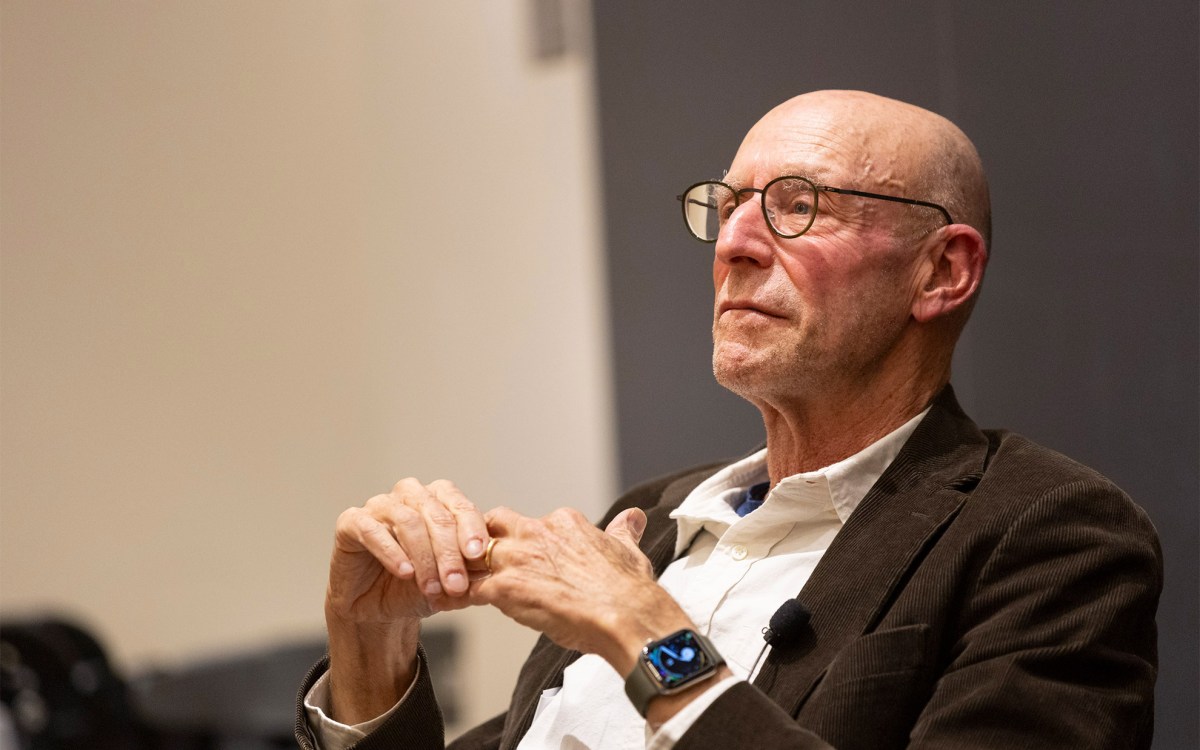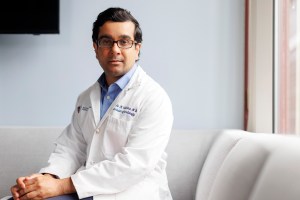Science & Tech
-

What exactly is consciousness? (And does my Venus flytrap have it too?)
In new book, author Michael Pollan explores nonhuman sentience, stream of thought, AI
-

Can a chatbot be a co-author?
Physicists take souped-up ChatGPT out for a spin, return home with significant discovery

-

Preserving learning in the age of AI shortcuts
In podcast, teachers talk about how they’re using technology to supercharge critical thinking rather than replace it
-

A ‘cocktail’ recipe for brain cells
Stem cell biologists discover how to regenerate type damaged in ALS, spinal cord injuries

-

When you do the math, humans still rule
Harvard’s Lauren Williams, a MacArthur ‘genius,’ joins international effort to challenge notions of AI supremacy
-

‘Imagination’
Less like a picture, more like a video game? Cognitive scientist explains how we ‘see’ what isn’t real.
-
Center on the Developing Child names Richmond Fellows
To support its goal of creating a new generation of leaders who have a broad perspective on the promotion of healthy child development and who recognize the need to bring…
-
New study outlines formula for effective community partnerships with a lens on mental health of students in urban schools
Addressing and improving mental health outcomes for students is a particularly complex issue in urban public schools. Proposed solutions to critical situations are usually prepackaged suggestions from research conducted outside…
-
Julius B. Richmond, giant in public health and pediatrics
Julius B. Richmond, a seminal figure in the history of American public health and pediatrics, and the first national director of the Head Start program, who held professorial positions at…
-
Scientists demonstrate highly directional semiconductor lasers
Applied scientists at Harvard collaborating with researchers at Hamamatsu Photonics in Hamamatsu City, Japan, have demonstrated, for the first time, highly directional semiconductor lasers with a much smaller beam divergence…
-
A new era in search for ‘sister Earths’?
Research presented at a recent astronomical conference is being hailed as ushering in a new era in the search for Earth-like planets by showing that they are more numerous than previously thought and that scientists can now analyze their atmospheres for elements that might be conducive to life.
-
Creating semiconductor lasers
Lasers are often considered to be highly directional light sources: their beams are able to propagate over long distances without substantial spreading. This, however, is not always the case. Semiconductor…
-
Susan Carey receives David E. Rumelhart Prize
Susan Carey, a Harvard psychologist whose work has explored fundamental issues surrounding the nature of the human mind, has been awarded the 2009 David E. Rumelhart Prize, given annually since…
-
David Parkes named professor of computer science
David C. Parkes, a leader in research at the nexus of computer science and economics, has been appointed Gordon McKay Professor of Computer Science in Harvard’s School of Engineering and…
-
DARPA awards interdisciplinary research team $1.2 million grant to study surface enhanced Raman scattering
The Defense Advanced Research Projects Agency (DARPA) has awarded a $1.2 million grant to an interdisciplinary team of Harvard researchers to study surface enhanced Raman scattering (SERS) for the first…
-
Peter Ashton: A legacy written in trunk, limb and leaf
They were in a bind, no doubt about it. Wearing little but cotton shorts, the four men huddled on a streambank deep in the Bornean rainforest. Water dripped from their…
-
Researchers develop new technique for fabricating nanowire circuits
Scientists at Harvard’s School of Engineering and Applied Sciences (SEAS), collaborating collaborating with researchers from the German universities of Jena, Gottingen, and Bremen, have developed a new technique for fabricating…
-
Indigenous culture clarifies nature and limits of how humans measure
The ability to map numbers onto a line, a foundation of all mathematics, is universal, says a study published in the journal Science, but the form of this universal mapping is not linear but logarithmic.
-
Small suds make a big splash at SEAS
The latest engineering feat to emerge from the laboratories at Harvard’s School of Engineering and Applied Sciences has been largely accomplished with the aid of kitchen mixers. Researchers have whipped up, for the first time, permanent nanoscale bubbles — bubbles that endure for more than a year — from batches of foam made from a mixture of glucose syrup, sucrose stearate, and water.
-
Mars’ water appears to have been too salty to support life
A new analysis of the Martian rock that gave hints of water on the Red Planet — and, therefore, optimism about the prospect of life — now suggests the water was more likely a thick brine, far too salty to support life as we know it. The finding, by scientists at Harvard University and Stony Brook University, is detailed this week in the journal Science.
-
Bat die-off in Northeast still mysterious
There’ll be fewer bats in backyards across the Northeast this summer after a mysterious ailment drove starving bats from their caves in the dead of winter in a futile, desperate search for insects in the region’s frozen, bug-free landscape.
-
Solar eruption seen in detail
On April 9, the sun erupted and blasted a bubble of hot, ionized gas into the solar system. The eruption was observed in unprecedented detail by a fleet of spacecraft, revealing new features that are predicted by computer models but difficult to see in practice.
-
HMS introduces wilderness fellowship
Snake bites, lightning strikes, hypothermia, tick bites, and avalanche injuries are not mishaps you ordinarily associate with Harvard Medical School (HMS), or with life in Boston.
-
Mars’ water appears to have been too salty to support life
A new analysis of the Martian rock that gave hints of water on the Red Planet — and, therefore, optimism about the prospect of life — now suggests the water…
-
How to move out and stay green at same time
With the end of the academic year fast approaching, the temptation to purge all obsolete office and school materials is stronger than ever. But to maintain Harvard’s impressive 50 percent recycling rate, Harvard’s University Operations Services (UOS) wishes to remind the community to continue recycling all materials whenever possible. All old documents, books, folders, magazines, catalogs, cardboard, and boxes are recyclable; and after receptions, meetings, and parties, bottles, cans, cups, and containers can be recycled.
-
Costa Rican minister outlines plan to achieve carbon neutrality through reforms
Costa Rica’s environment minister outlined the Central American nation’s plans to become carbon neutral by 2021 through green reforms in energy, transportation, government, and private industry sectors.
-
Undergrads create ‘dirt-powered’ light for Africa
A team composed of Harvard students and alumni was among the winners of the World Bank’s Lighting Africa 2008 Development Marketplace competition, held in Accra, Ghana, from May 6 to 8, 2008. The team’s innovation, microbial fuel cell-based lighting systems suitable for sub-Saharan Africa, netted the Harvard group a $200,000 prize.
-
Ashton: A legacy written in trunk, limb, and leaf
They were in a bind, no doubt about it.
-
Zittrain speculates on Web’s trajectory
Jonathan Zittrain is a man with a passion for cyberspace and a concern for its future.
-
New journal highlights undergraduate research
Spanning topics as diverse as cancerous tumors and the overfishing of grouper in the Turks and Caicos Islands, a new journal aims to highlight the serious scientific research regularly undertaken…
-
Presidential election will bring change in federal stem cell policy
Embryonic stem cell research will likely have a more sympathetic ear in the White House after November’s presidential election, but a panel of speakers said last night that an era…
-
Study identifies food-related clock in the brain
In investigating the intricacies of the body’s biological rhythms, scientists at Beth Israel Deaconess Medical Center (BIDMC) have discovered the existence of a “food-related clock” which can supersede the “light-based”…
-
Harvard researchers selected for National Academy of Sciences membership
Eight Harvard faculty members this week were elected to membership in the National Academy of Sciences in recognition of their distinguished and continuing achievements in original research. The three women…
-
Humanities: From deconstruction to digitization
Malcolm Hyman, a research associate at the Max Planck Institute for the History of Science in Berlin, addressed a group of 20 listeners at the Barker Center about the theoretical challenges ahead for humanities computing — a fast-growing corner of scholarship in the classics, modern literature, and the arts that looks to computer science for analytical help.
-
Markey addresses ‘Future of Energy’
The chair of the U.S. House Select Committee on Energy Independence and Global Warming struck an optimistic tone about the planet’s climate crisis Monday (April 21), saying that an energy revolution is in the offing if government can just get the policy right.
-
Policy can empower technological climate change solution
The chair of the U.S. House Select Committee on Energy Independence and Global Warming struck an optimistic tone about the planet’s climate crisis last night, saying that an energy revolution…


